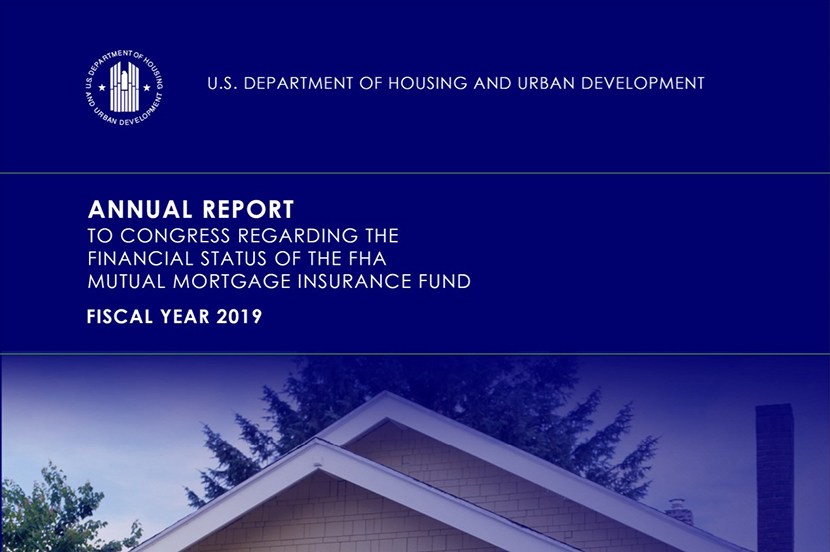
FHA Actuarial Report Shows MMI Fund Capital Ratio at 12-Year High

FHA released its 2019 Annual Report to Congress, showing the FHA Mutual Mortgage Insurance Fund–which fell to dangerously low levels earlier in the decade–rose to its highest level since fiscal year 2007.
The independent actuarial report (https://www.hud.gov/sites/dfiles/Housing/documents/2019FHAAnnualReportMMIFund.pdf) said at the end of Fiscal Year 2019, the FHA MMI Fund Capital Ratio stood at 4.84 percent, well above the congressionally mandated minimum of 2 percent. However, the report did note that the FHA reverse mortgage program, the Home Equity Conversion Mortgage, continues to lose money, although those losses were cut by nearly half over the past year.
“The financial health of FHA’s single-family insurance fund is as sound as it has been in over a decade,” said HUD Secretary Ben Carson during a press briefing yesterday. “We have a strong economy with nearly full employment…and this economic growth helps set the foundation for ongoing improvements in our FHA portfolio.”
The MMI Fund supports FHA’s single-family mortgage insurance programs, including all forward mortgage purchase and refinance transactions, as well as mortgages insured under the HECM program, since FY 2009.
“This report is welcome news,” said FHA Commissioner Brian Montgomery. The improvements we’ve begun to put in place in the last two years to stem the losses of the reverse mortgage portfolio, aided by favorable economic conditions, are contributing to some improvements in our reverse mortgage portfolio. Looking forward, we must focus on seeking the right balance between facilitating access to mortgage credit and managing risk.”
MBA President and CEO Robert Broeksmit, CMB, said MBA was pleased the report showed the FHA MMI Fund continued to grow and strengthen.
“It is a clear sign that HUD is responsibly fulfilling its core mission of helping first-time homebuyers and other underserved borrowers attain affordable, sustainable credit without exposing taxpayers to unreasonable risk,” Broeksmit said in a statement. “The Fund’s capital ratio, which is now more than twice the statutory minimum, indicates that HUD’s policy changes over the last few years have had their intended effect of stabilizing the Fund and rebuilding reserves in order to prepare for any future downturns.”
Broeksmit said MBA encourages HUD to closely monitor risks to the Fund, including the layering of risks that could contribute to future defaults, as well as oft-cited challenges associated with the HECM program. “MBA urges HUD to continue to address ‘extreme risk layering’ quickly to protect the core of the program, while also exploring ways to ensure that premium levels for forward mortgages are not adversely impacted by the challenges in the HECM program. Together, these actions will allow HUD to set premiums that reflect the improved health of the Fund.”
HUD provided the following highlights from the Annual Report:
–The Capital Ratio for FY 2019 was 4.84 percent, the highest level since FY 2007. Losses during the financial crisis drove the MMI Fund below its required minimums, forcing both increased fees to borrowers and an eventual cash infusion from the U.S. Treasury, the first in FHA’s three-quarter century history.
The fund fell below the 2% congressionally mandated minimum in 2009 and remained under the minimum until fiscal 2014.
Montgomery was non-committal as to whether further cuts in MMI premiums would take place. “I don’t think we’re there yet, but it’s something we’re looking at,” he said.
–FHA had insurance-in-force on single family mortgages valued at nearly $1.3 trillion at the end of this fiscal year.
–The performance of the forward book of business posted a stand-alone capital ratio of 5.44 percent. The MMI Capital (formerly referred to as economic net worth) of the forward book of business also improved year-to-year by more than 42 percent with a value of over $66.6 billion.
–The HECM portfolio continues to show a negative stand-alone capital ratio, but improved substantially from -18.83 percent capital ratio in FY 2018 to -9.22 percent in FY 2019. The HECM portfolio also showed an improvement in MMI Capital, increasing by $7.7 billion. “This is a marked improvement,” Montgomery said. “The performance of the forward book supports the HECM program. We anticipate that policy changes we have implemented over the past two years show these changes are having a positive impact.”
Pinnacle Actuarial Resources Inc. served as the independent actuary for the FY 2019 report. The report this year includes modeling assumptions aimed at better explaining potential future risks under “stress events” and “extreme stress events.”
